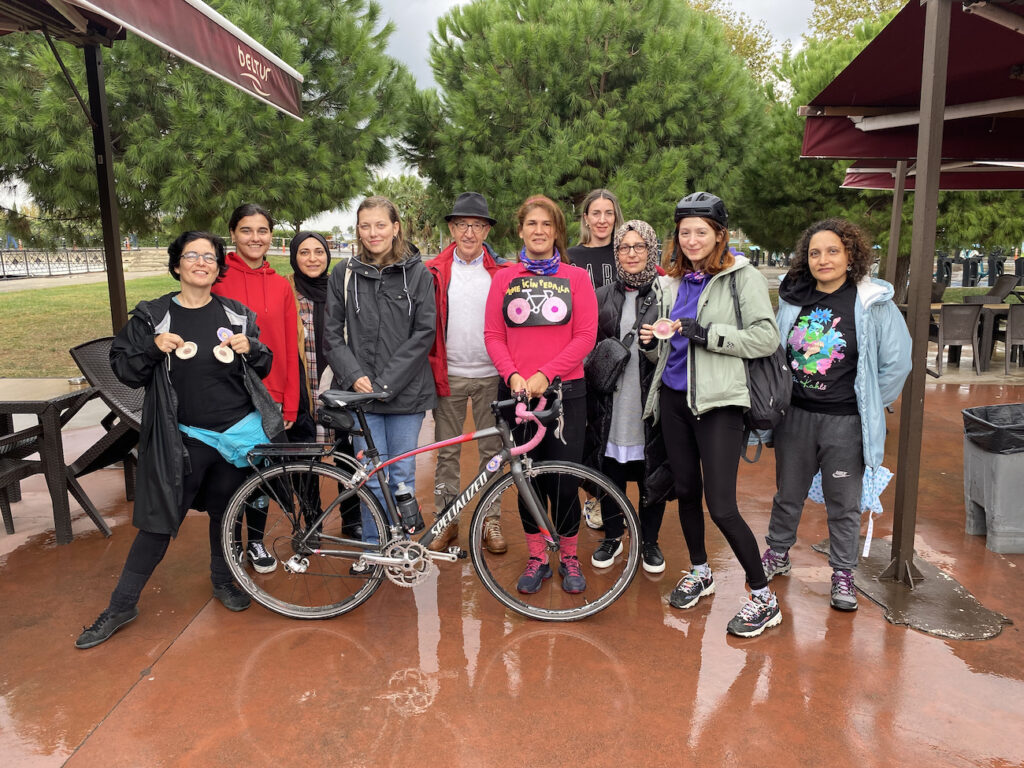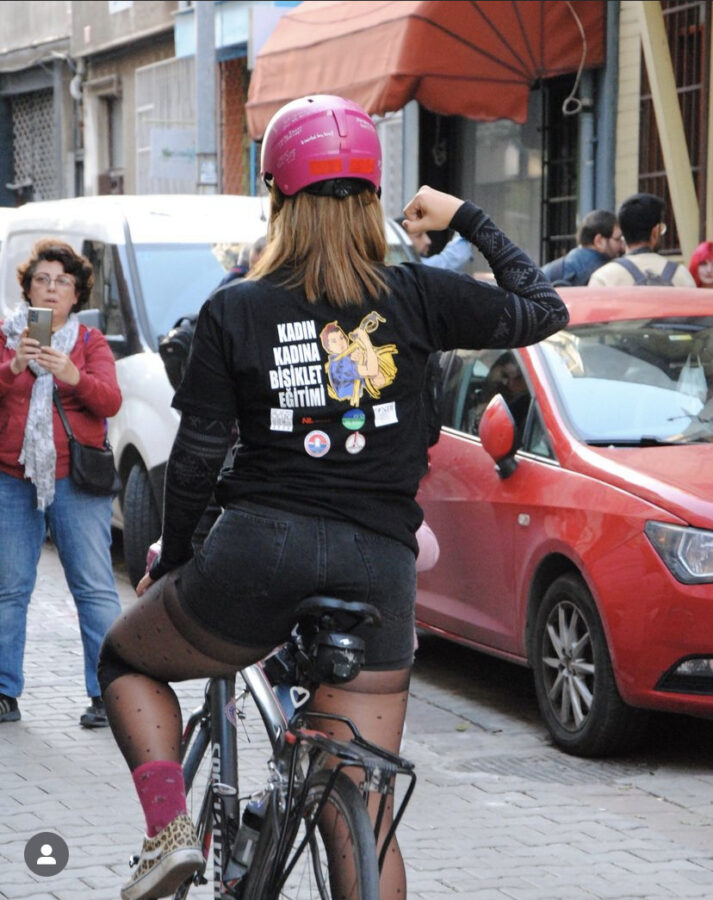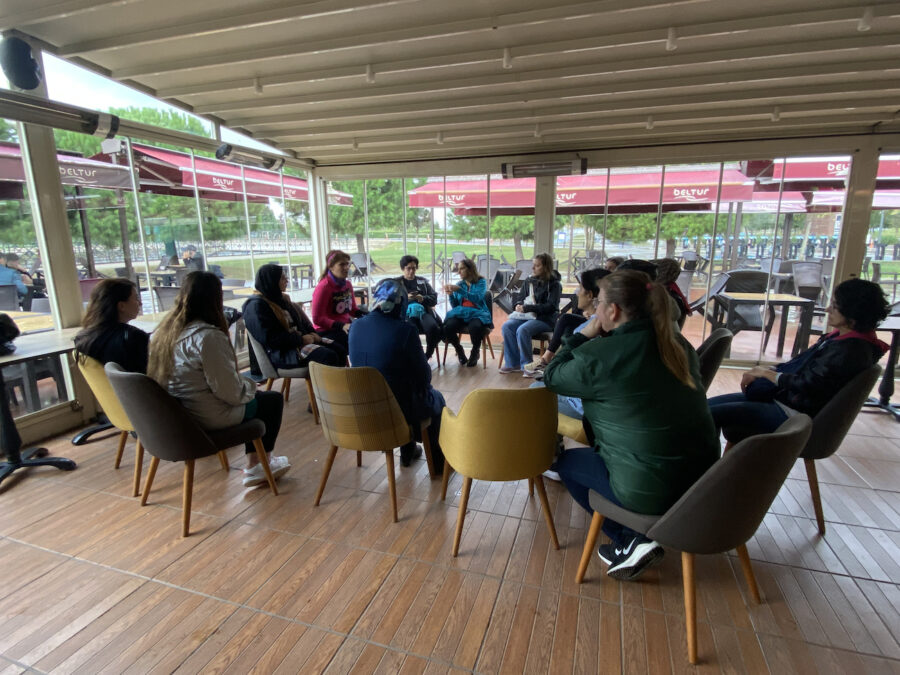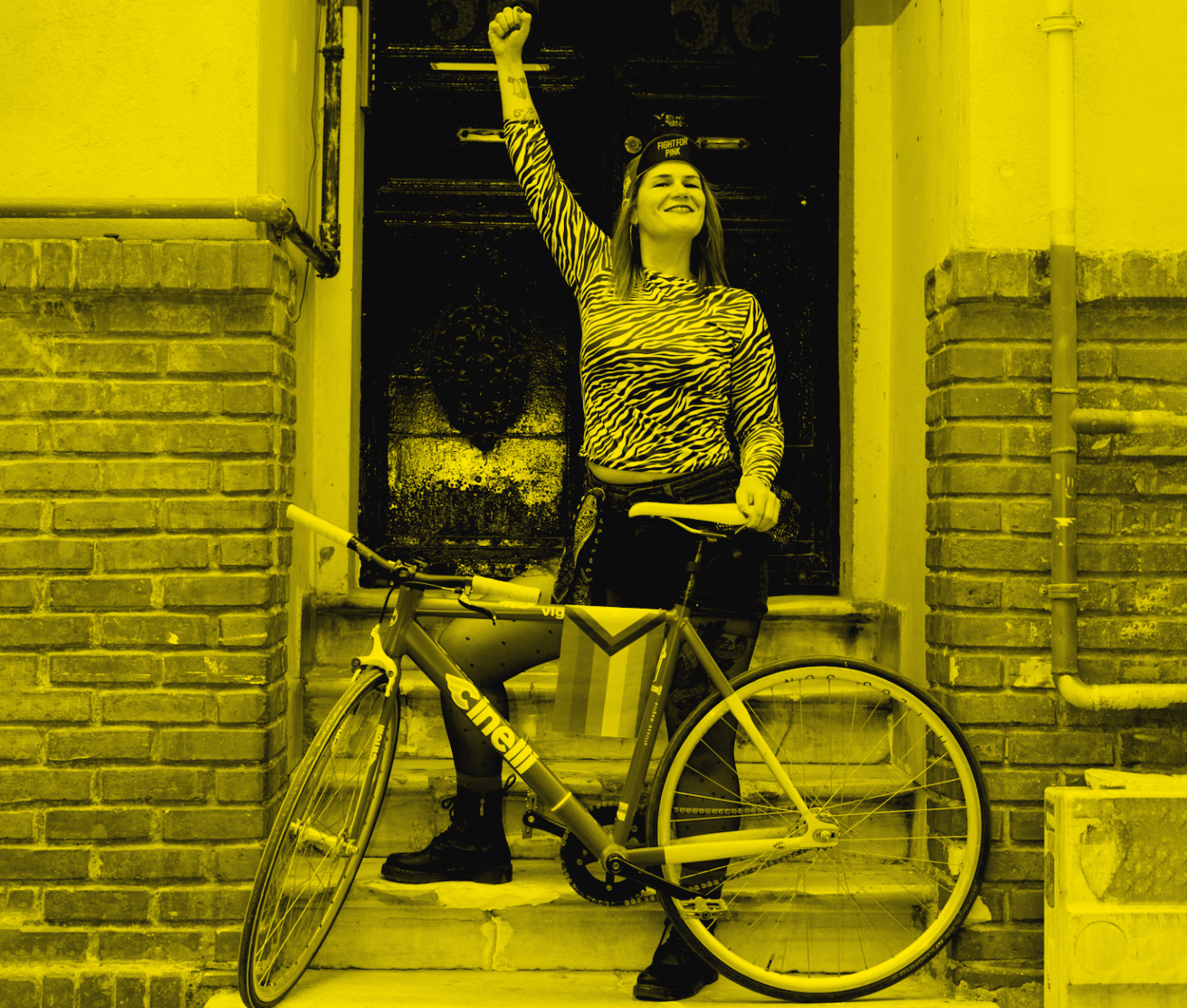15 min. read
Hande Karaca is the Bicycle Mayor of Istanbul and founder of Chain Breaking Women, an initiative with the belief that cycling is an inseparable part of women’s solidarity. In this interview we expand on her journey as a cycling advocate and the future of her cycling training for women in Turkey.
—
Could you please start by introducing a bit about yourself and your cycling initiative in Turkey?
I‘m Hande Karaca from Istanbul, Turkey, and I am the leader of the initiative Chain Braking Women. We started our work in 2019, but now in 2022, we are calling ourselves an association. In the beginning we were a small initiative, but now we’re actually aiming for thousands of women involved.
This initiative has three points, like a triangle which is commonly the shape of a female. One point refers to how we are trying to empower women with bicycle education. During the pandemic, we saw so many women suffering inside their homes because of domestic violence against them. So many women were in danger, and we just couldn’t do anything, no one could leave their homes because of the health risks. So we had to find a way to reach them and to help them. So we thought, “maybe we can cycle!” We can cycle and we can help other women by teaching them to cycle.
The Turkish government doesn’t have these types of training programs. We have motorcycle teachers with a diploma from the government that say that you’re a teacher. We have diplomas for basketball teachers, we have teachers for so many sports but not cycling. Then I had to find a different way to call our trainers because we didn’t have an official certificate system. So now we now call them “cycling ambassadors”. Then I had to figure out other things, like the content of the training, or what would be the supporting system that would show that I’m really capable of delivering those trainings.
This challenge led me to reach out to a woman called Angela from New York that has an initiative called Get Women Cycling. She was teaching these old women how to cycle and a little bit of bicycle mechanics too. And honestly, I asked her for everything she was teaching there. She’s so gentle, and she just gave me all the information without asking anything in return. She just replied to me “how can I help you sister?” So it really felt like this sisterhood worldwide.
The second help came from Europe, from an initiative called Bike Bridge from Freiburg, Germany. And that’s another woman of course, her name is Shehrazat. She’s originally Iranian but when she came to Germany she couldn’t find any friends in the beginning. Of course, how could she make any friends with this huge cultural gap between German women and German people in general? So that’s why she called her initiative “the bridge”, because through cycling she was creating a bridge for this gap. And now, she has helped many other immigrant ladies like her from Iran, Turkey, from Uzbekistan, everywhere. Although she is teaching bicycle education, there are other cultural aspects that people are actually sharing in her training program. So I asked her if I could use the system she had developed for my initiative, and she completely agreed.
So on one side I had an American woman helping me with good support, and one German friend who helped me with this education system. But again, it was all from outside of my country, so I had to find something inside the country too.
I went to the Dutch embassy in Istanbul, because I knew that the Netherlands has always been a good supporter of cycling. The Dutch ambassador was a really good man, and he kept asking me “how can I help you?”. I just asked if I could use the royal logo from the Netherlands, which I knew could open so many doors for me, when talking to municipalities or governments in Turkey. He said yes, which became the cultural support for the system we were trying to create at the time. With his support, I had these amazing external supporters, which made me feel ready to address municipalities.
So, with the help of these three main supporters, somehow I got a green light from the municipality of Istanbul to start doing these training sessions. And I am still here, implementing this bicycle education system.

I’m curious to know what was your road into cycling at a more personal level, for you to realise that cycling is the one tool that can solve so many issues?
I was working in a commercial business and I was writing projects for brands. I was always on the “bad side”, let’s say, because I was just trying to make people consume more. But after my thirties, I started thinking that maybe I should do something for the goodness of the people. I started cycling when I was seven, so I think cycling was always with me, but I never thought it was going to be an empowering thing in my life.
But then with the divorce, you know that’s where the name came… Chain Breaking Women is my divorce story. When the divorce came to my life, I started feeling this emptiness inside, and wondering how I could make a community. So in the beginning, this cycling movement actually healed me, and it changed me, of course. I think it made me a leader.
The bicycle naturally gives you power by riding it. When you ride a bike by yourself, you are handling everything on your own. The bicycle itself gives you that feeling of doing whatever you want and without harming anyone or anything, just by your own willpower. You can change anything you want, and you can believe it.
I went on a cycling trip to India last year. And everyone was saying, like “you’re not that good at mechanics”, “you’re not good at racing, you can’t do it”. But I thought “why not”, in the end I can at least try… and I did, by the way. I was the first woman who did this solo trip to India.
I am always calling my bicycle like a sister. She is my sister and I’m not feeling alone anymore with her. I always feel that she can support me. And with all the work I’m doing in the association, I want to give this feeling to other women who are suffering from a lack of support.
We tell men that they have the right, that they have the courage. We’re always pushing men to the front. But for women, we are always questioning them, and making them feel like “are you sure? you are saying that you can, but can you really?”
Sadly, we always question ourselves and our power, our knowledge, and we allow others to do the same. And I think that the bicycle actually can break this chain, because you’re seeing it, it’s getting real. In reality, when you are riding the bike you’re realising “maybe I can go that far”, with your own willpower and your capacity and you do it. So, in the end, all these question marks are gone, and it makes you say, “yes, I can”. For me, the bicycle was the thing that made me a leader. And now I’m saying to everyone “it can change you too”.
I’m a yoga teacher by the way, so I believe in this energy thing. I think the bicycle helps our female energy, as it has this circular movement. If you think about it, women themselves constantly encounter a circular movement in their lives with the menstrual cycle, and even our physical shapes are more circular.
A bicycle has so much circular movement and always goes forward, so it makes you go forward too. So this magical thing [the bicycle] is actually helping us to remember that there’s a cyclical movement possible, that heals us inside, and makes us think forwardly without having these question marks in the mind. So many feminist movements actually have used the bicycle. Somehow, we see bicycles in moments of female transformation. Like Susan B. Anthony was cycling, and the suffragettes.

Would you say that the bicycle can be seen as a symbol related to female empowerment then?
I think it should be, and it can be. So many things in our society are really dominated by men and everything, especially in cycling, seems like a man’s job. And it’s so sad because “the bicycle”, “la bicicleta ”, in so many languages, is a female word, but in reality it is a male-dominated field.
It was the same thing with yoga. In the beginning yoga was only allowed for men, and now you’re seeing so many women around in every yoga class. Even men think, “I can’t do yoga, it’s a woman thing”. I’m foreseeing the same destiny for bicycles because it’s probably something that we can carry easily and it works with endurance, which is something that women are really good at; we can handle the pain much better than men. So it’s our game actually, and in the end we’re gonna learn that the bicycle is our thing. In that field we are strong.
But for now cycling is definitely a male dominated thing. When you see countries like Afghanistan, Syria or even Turkey, there are so many Middle Eastern countries that are still struggling with women’s issues. So, of course women are not that good at cycling either, but there’s a hope that they will understand the power of cycling. That’s why when we were teaching cycling, we are always trying to include some feminist information. For example when we tell them about the brakes, we tell them that they have to learn how to use them before riding the bicycle. Before getting on top of the bicycle, they have to learn how to use the brakes. And when they ask me, I always say that using the breaks is like learning how to say “no”. If we want to control our lives, we have to learn how to use the word “no”, but because we’re so polite, we are seeing so much “yes”. Which can be a great thing, when it opens many possibilities in life. But sometimes saying “no” means that we have control. So learning how to use “no” it’s so important for women in general.
So this kind of feminist lessons we are trying to teach through the bicycle. Because so many Middle Eastern governments and cultures don’t understand yet. But with the bicycle we can portray a physical experience of this lesson.
It seems like you’re not only teaching these women how to cycle, but also supporting them in a very intimate way. So, I’m curious to know about the effect of having a network of support. How do you think that this cycling community has changed their lives?
So in a bicycle there’s so many circle strikes. There’s the pedal system, there’s the tire system. Different sizes, a small one and a big one. So the effects of the bicycle are the same. In a small way, it impacts you. But like the tire system, it has an effect in the community, so a bigger effect.
There’s an expression in feminism that goes “you will not walk alone”. We changed the expression to “you will not ride alone”. It can still be dangerous in Turkey if you cycle or if you walk at night, which is terrible. But if you cycle with a sister, it would be easier for you and you can talk and you can share so many feelings. We just did a project with BYCS called Chain Breaking Mama. And during that we understood that when a mother and kids are cycling together, they’re sharing this energy together like they understand who is the leader, and that the leader can change. You’re not telling it, but you’re actually showing it. It’s so easy to understand.
In the Dutch Embassy, they showed us a movie about birds. Birds are always navigating in a triangle position and the leader is always changing, so every bird has the opportunity for being a leader at some point. I think that is a beautiful way to teach someone how you can change positions in your life and how you can respect the position of others. Cycling with a community can teach us so many things about life that we actually don’t know much about.
So, do you consider that learning how to cycle is a way for women to take leadership in their own communities, regardless if they’re cycling every day or not?
Of course. and I’m telling you if you’re a leader already like a doctor or a lawyer, a leader in your community, you have to cycle. If you cycle, you open the possibility for other women to copy you, and they will probably also cycle someday. I think it’s like a domino effect; we have to cycle, so other young women and girls after us can cycle too.

Sometimes it’s hard to explain to women all the opportunities that cycling can offer, especially when other fears, social stigmas, and cultural barriers come into place. What can we do to help more women understand that cycling can be a tool for freedom, empowerment, and other possibilities?
It’s hard if someone has constant fear in their life. The fear of cycling, it’s a cultural thing. For example, If someone doesn’t cycle in the Netherlands, it is for a different reason than someone who doesn’t cycle in Turkey, or any other Muslim country. In Turkey, we constantly have this really stupid reason. We are dependent on labor here; we have to take care of the kids, cook, clean, andwork. So we don’t have this chance or luxury, to ‘break’ our body or get harmed by cycling. Which sometimes makes no sense at all. So many different reasons that we have to fight against, and that’s how we can actually change the situation. If we learn what are the reasons behind the fear, it’s gonna be easier to find ways to fight it.
What I’m seeing during this time teaching, is that my communication must be positive all the time, even when speaking about “falling”, for example. So, what I’m working on is a kind of positive communication. I don’t want to lie; I can’t say, “I never fall” or “you’ll never fall”. So I say: “When you were really little, you were falling until you learned to walk. Falling is a natural process; don’t focus on that. Let’s focus on something else, like the beautiful roads that you’re gonna cycle on.” This way, I’m trying to change their minds about it through my communication.
The second thing is, I have this tattoo on my leg that says “salvation is a lonely progress”, which I learned last year by trying to teach so many women to cycle. I had this constant question in my mind of how I’m gonna teach all these women, you know. Then I learned this magical sentence, “salvation is a lonely progress”.
What I am trying to say is that the best thing you could do to change the system is showing through your life, with your actions. If you want to shake the world, you have to do it by yourself first and you have to show it every day.
Thank you so much for sharing that with us, Hande. I came to the Netherlands from a context that probably is a bit more similar to Turkey, towards cycling uptake. This conversation has just reminded me about the transformative power that this “small tool” has on us, and all the possibilities that are out there for our communities through cycling.
And we should never underestimate the little tools. Scissors are the most beautiful example of that. How you can change the world with something really small like scissors; whether you’re cutting the baby’s umbilical cord, plants, clothes, or hair. A bicycle is just like scissors; it’s so small and so simple, and everyone can do it if they try and aren’t afraid of it.
Is there anything else that you would like to add?
I have this dream of having a Chain Breaking Women community house. Even though my movement is a mobility thing, I know that in life you need to have time to rest. That’s what makes a bicycle good. You don’t have to run, or be that fast always. Sometimes you want to stop, and the fact that you’re able to stop is beautiful. And I want to give that chance to women; I want to make this community house which is free for all women who need one day rest in their life. Whether you’re maybe running from a fight, from your husband, or maybe you just don’t want to hear any noise for a day. If you want one day of rest then you can knock on the door and say “I’m the Queen for now”.
I’m not dreaming about a fancy hostel, but just having this Chain Breaking Community House where we can have more cycling education. I know that life is all about movement, but I also know that we all can have a break too. And I think that’s how we will change the system somehow. It might be the start of a movement — by stopping.
That’s a beautiful analogy and I wish all the best for that initiative. I am certain that you will be doing amazing things for many many women.

